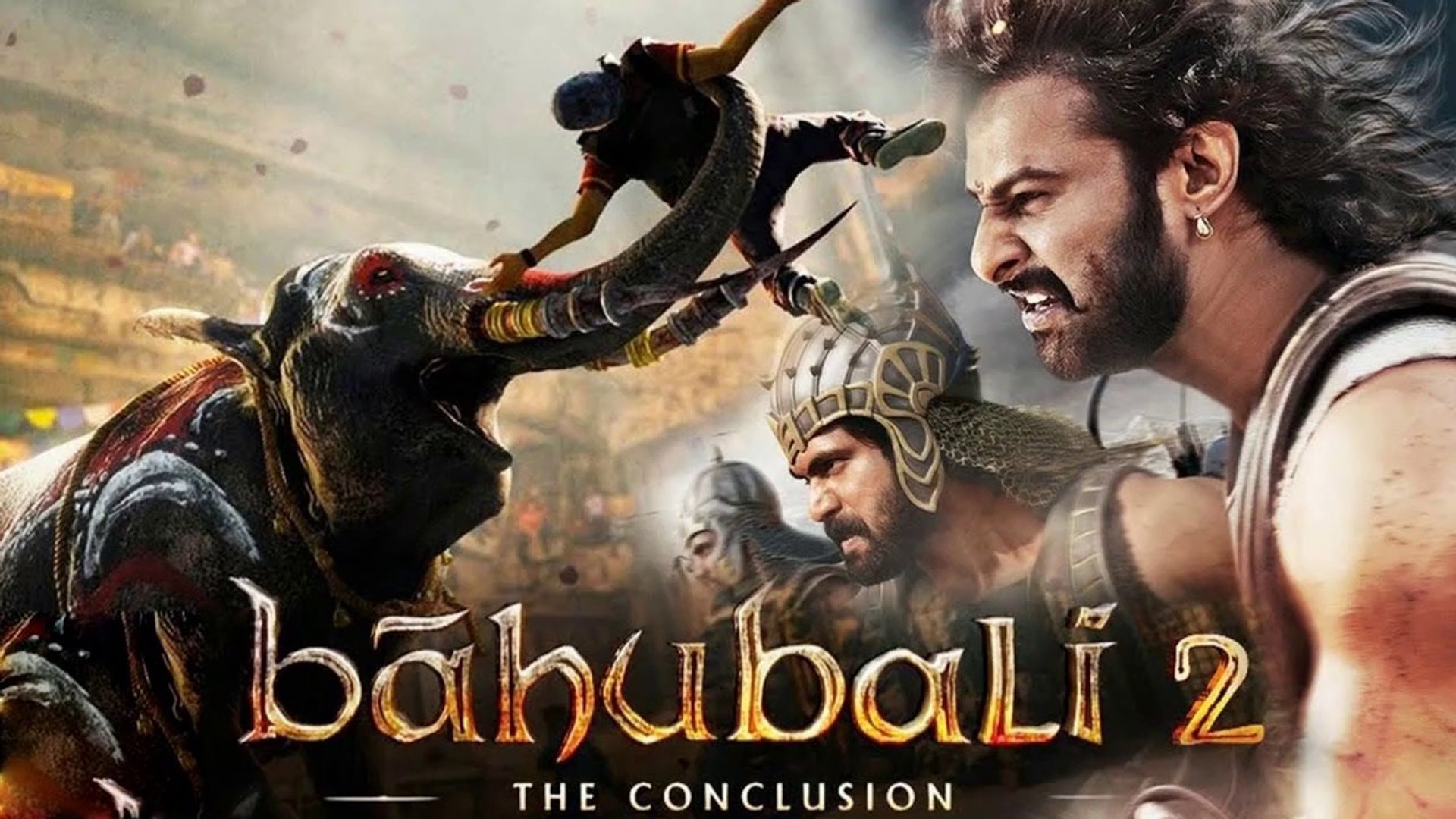“Baahubali 2: The Conclusion 2017”

“Baahubali 2: The Conclusion” (2017) is an Indian epic action film directed by S.S. Rajamouli. It is the sequel to Baahubali: The Beginning (2015) and the second part of the Baahubali franchise. The film, like its predecessor, was a massive commercial success, becoming one of the highest-grossing films in Indian cinema and solidifying its place in global pop culture. Baahubali 2 delivers a stunning conclusion to the grand, action-packed saga that captivated audiences with its spectacular visuals, intense battles, and emotional storytelling.
Plot Summary
Baahubali 2 picks up from the cliffhanger of the first film, where the fate of Mahishmati Kingdom hangs in the balance. The film tells the story of Shivudu (Prabhas), who learns about his true heritage and the tragic history of his father, Baahubali (Prabhas), and his kingdom. The narrative is divided between two timelines: the present-day events surrounding the kingdom’s political struggles and the flashback that explains the past.
The film’s central conflict revolves around the power struggle in the Mahishmati kingdom, primarily between Baahubali and his treacherous brother Bhallaladeva (Rana Daggubati). Baahubali, who had once been a heroic and beloved ruler, is betrayed and murdered by Bhallaladeva, who seeks to take the throne for himself.
In the present, after learning of his father’s fate and his true lineage, Shivudu (also known as Mahendra Baahubali) seeks to avenge his father’s death. The film explores his journey to reclaim the throne and bring justice to the kingdom. He must face Bhallaladeva and navigate the palace politics, which are filled with deceit, betrayal, and treachery.
The film also delves deeper into the love story between Devasena (Anushka Shetty) and Baahubali. In the flashback, Devasena, a warrior princess, and Baahubali’s bond is explored, and their romantic relationship plays a crucial role in the kingdom’s political and personal dynamics. The climax of the film reveals the truth behind Baahubali’s death and the final confrontation between Shivudu and Bhallaladeva.
Key Themes
- Betrayal and Revenge: A central theme of the film is betrayal—both personal and political. Bhallaladeva’s betrayal of his brother, Baahubali, and his quest for power drives the conflict of the story. Shivudu’s quest for revenge against Bhallaladeva is not only about reclaiming the throne but also about avenging the injustice done to his father.
- Duty and Leadership: The film explores the qualities of a true leader through Baahubali’s character. Baahubali embodies justice, honor, and sacrifice, and his journey showcases the responsibilities of leadership. Shivudu’s transformation into Mahendra Baahubali symbolizes his growth into a leader who must face the challenges of ruling with wisdom and compassion.
- Love and Sacrifice: The love story between Baahubali and Devasena is another key emotional thread. Their love is pure, and their sacrifices for each other represent themes of loyalty, honor, and duty to the greater good. The sacrifices made by both characters are a significant part of the plot and its resolution.
- Family and Legacy: The concept of family, lineage, and legacy is explored deeply, particularly through Shivudu’s journey. His search for truth and justice is not just about his personal quest but also about honoring the legacy of his father and the rightful place of the Baahubali family in the kingdom.
- Honor and Justice: The film heavily emphasizes the importance of justice and honor, with both Baahubali and Shivudu standing as symbols of these values. Their actions reflect their commitment to protecting the kingdom and their people, and their ultimate triumph is symbolic of the victory of good over evil.
Character Development and Performances
- Baahubali / Shivudu (Prabhas): Prabhas delivers an iconic performance, effortlessly embodying both the youthful vigor of Shivudu and the regal strength of Baahubali. His transformation from a carefree young man into a powerful and compassionate leader is central to the film’s emotional impact.
- Bhallaladeva (Rana Daggubati): Bhallaladeva is one of Indian cinema’s most memorable villains. Played by Rana Daggubati, Bhallaladeva is power-hungry, ruthless, and manipulative. His intense performance adds depth to the character’s menacing persona, making him a formidable antagonist.
- Devasena (Anushka Shetty): Anushka Shetty’s portrayal of Devasena is one of strength, wisdom, and love. Devasena is a warrior princess who fights for justice and loyalty, and her relationship with Baahubali is central to the film’s emotional arc. Anushka’s performance adds a significant emotional depth to the narrative.
- Kattappa (Sathyaraj): Kattappa is a key figure in the Baahubali films, serving as the loyal servant of the royal family. Sathyaraj’s portrayal of Kattappa is one of deep emotion and loyalty, and his actions in the film carry significant weight. His relationship with Baahubali and the ultimate revelation about his role in Baahubali’s death is one of the film’s most dramatic moments.

Action and Visual Effects
Baahubali 2: The Conclusion is known for its epic action sequences, large-scale battles, and spectacular visual effects. The battle sequences, especially the battle of Mahishmati and the final duel between Shivudu and Bhallaladeva, are shot on an enormous scale and are filled with dramatic moments that highlight the heroism and sacrifice of the characters. The film’s visual effects team did an incredible job of blending CGI with practical effects, creating stunning landscapes, massive battle scenes, and intricate action choreography.
The use of slow-motion and grand cinematography during action scenes adds to the film’s grandeur, creating a cinematic experience that is both visually stunning and emotionally engaging. The film’s art direction and set design are equally impressive, transporting audiences to the mythical world of Mahishmati with intricate palaces, breathtaking landscapes, and grandiose sets.
Reception and Legacy
Baahubali 2: The Conclusion was a colossal commercial success, becoming the highest-grossing Indian film of all time at the time of its release and receiving critical acclaim for its direction, performances, action sequences, and visual effects. The film was lauded for its ability to deliver a satisfying conclusion to the story while maintaining the epic scale and emotional depth of the first film.
Critics and audiences praised the film for its epic storytelling, particularly in how it balances action and emotion, as well as its ability to bring the characters’ arcs to a satisfying conclusion. Baahubali 2 solidified the legacy of the Baahubali franchise and became a landmark in Indian cinema, influencing a new generation of filmmakers and inspiring several other big-budget epics in the Indian film industry.
Cast and Crew
- Director: S.S. Rajamouli
- Writer: S.S. Rajamouli, K. V. Vijayendra Prasad (story)
- Cast:
- Prabhas as Baahubali / Shivudu
- Rana Daggubati as Bhallaladeva
- Anushka Shetty as Devasena
- Sathyaraj as Kattappa
- Tamannaah Bhatia as Avanthika
- Nassar as Bijjaladeva
- Ramya Krishnan as Sivagami

Fun Facts
- Prabhas’s Training: Prabhas underwent extensive physical training for his role as Baahubali, transforming his physique for the demanding action scenes. His dedication to the role was praised by fans and critics alike.
- Record-Breaking Box Office: Baahubali 2 set several records at the box office, becoming the first Indian film to gross over ₹1,000 crore globally.
- The Title’s Meaning: The name “Baahubali” means “one with strong arms” or “the one with powerful arms,” reflecting the character’s strength and heroic qualities.
Conclusion
Baahubali 2: The Conclusion is an epic cinematic achievement that combines grand action with emotional depth, delivering a satisfying and visually stunning conclusion to the Baahubali saga. S.S. Rajamouli’s direction, combined with stellar performances from the cast and groundbreaking visual effects, makes this film a landmark in Indian cinema. The film’s themes of loyalty, family, sacrifice, and justice resonate universally, and it remains one of the most celebrated films in the history of Indian cinema.











